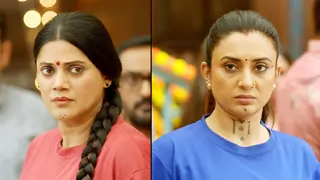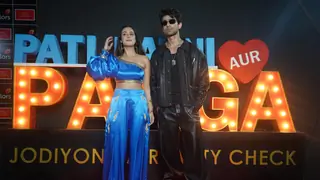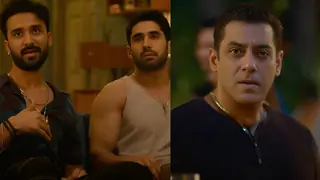Bondhu rangila re -- a tribute to S D Burman
An ardent admirer remembers the tunes and qualities that made this composer so endearing and so hard to forget
Come October 31 and it's time for music lovers to remember Kumar Sachin Dev Burman. It was on this day in 1975 that the great music composer left us.
To me Dada Burman's most enduring image is of a wizened potliwala baba with twinkling eyes who would delve deep into his bag and pick out an enchanted, animated tune and place it on your palm. A tune that would wriggle itself to your ear and start playing, mesmerizing you into a trance every time it did that. Or then there is the image of an ascetic with a ektaraa in hand chanting 'Rongila, Rongila Rongila Re, amare chardiye re bondhu koi gela re'. (Oh my dear colorful friend where have you gone away leaving me behind) or that of a boatman piercing your very soul with his call of 'Mere Sajan hai us paar'.
So on his 27th death anniversary here is a tribute to our dearest Bondhu Rongila.
Amare chadriye re bondhu koi gela re?
A LITTLE ABOUT HIM
Kumar Sachin Dev Burman was born in 1906 in Comilla (East Bengal) into the royal family of Tripura. His father Nabdweep Chandra Dev Burman was an accomplished sitar player as well as a dhrupad singer. He was also his first guru.
In his youth Dada Burman came to the musical capital of the East -- Calcutta. Here he further enhanced his musical education learning under maestros like Ustad Badal Khan. He was also a disciple and follower of the legendary K C Dey (Manna Dey's uncle). He started his career composing and singing for the radio. He made his mark as a light classical and folk singer before taking up composing for Bengali films.
In 1946 he moved to Bombay, taking up Ashok Kumar's offer to compose for Bombay Talkies. His first film was Shikari. He struggled for a brief period, and decided to quit and head back for Calcutta, but was persuaded to stay back. He finally struck gold with the perennial 'Upar gagan Vishal' (Mashaal) and 'Mera sundar sapna beet gaya' (Do Bhai). With Baazi and 'Tadbeer se bigdi hi tadbeer bana le' sung by Geeta Roy, Sachin Dev Burman had finally arrived.
He was married to Meera Devi who was a Bengali poet and singer. She wrote the lyrics for a large number of his Bengali songs and assisted him in his music making. Dada and Meera Burman had only one child, the legendary Rahul Dev Burman.
MUSICAL INFLUENCES…
S D Burman's music was an eclectic mix of various musical forms. His primary and most favourite influence remained Bengali folk music. His early years were spent amidst the rolling hills and the lush mountain valleys of the North-East. The rich musical tradition of this region left an indelible mark on the young Sachin. Years later he wrote that his art drew heavy inspiration from the outdoors of Tripura, where he spent his childhood.
He always strove to capture the freshness of wild, untamed nature in his compositions. This trait is not only apparent in compositions like the dew fresh Kishore-Lata duet 'Gori Gori gaon ki gori re' from his tribute-to-the-North East film Yeh Gulsita Hamara but also implicitly in songs like 'Piya bina, piya bina' from Abhimaan and 'Megha chhaye aadhi raat' from Sharmilee which have a strong North Eastern influence in the melodic structure.
He had a special liking for Baul and Bhatiyali folk forms of Bengal. He himself was an accomplished Bhatiyali (the song of the boatman) singer and came into prominence in the Hindi music scene with his memorable rendition of a Bhatiyali adaptation -- 'Dheere se jaana bagiyan mein re bhanwra'. His rendition is said to have mesmerized Jaidev so much that he sought him out to become his assistant!
In addition to folk music, Rabindra Sangeet and light classical forms like the thumri formed his building blocks. Burmanda also had a very unique sense of rhythm. Melody and rhythm blended in perfect harmony to make his compositions extremely captivating.
GRACEFUL AND SIMPLE, YET INIMITABLE
The outstanding point of Sachin Dev Burman's music is that it was never overtly complex and never pretentious. His tunes were always simple, graceful, hummable yet heartfelt. He would always say that film music should appeal to the common man. Film to him was not a medium to show off classical knowledge. And he never did. However, when he did occasionally go the classical route he came up with breathtaking beauties like 'Jhan Jhan jhan jhan payal baaje' or 'Poocho na kaise maine rain bitayi'.
Legend says that Sachinda got this lesson in simplicity early in his career. During the early years when his music was not quite hitting the jackpot, Dada once caught his servant playing Naushad's Rattan song in his music room. Rather than get annoyed, he curiously asked the boy what appealed to him in that music. While he obviously did not get a cohesive answer out of the boy, Sachinda got the point. Film music cannot afford to be too esoteric.
After that he kept complexity completely out of his music and made sure it was always hummable. He would often summon his servant or driver to take their final opinion on his tunes, trusting their judgement more than that of the musically literate people around him.
To me, however, the most beautiful part about Dada's music is that, despite being aimed at the masses, it never lost its appeal for the connoisseur. This is no mean feat by itself. Even in crowd-pleasing songs like 'Jeevan ke safar mein rahi' Burman Dada betrayed his class. There are few composers who could achieve that balance.
WHAT STOOD OUT
A look into Sachinda's almost 40-year career (including his stint in Calcutta) shows us that Sachinda's biggest quality was to change with time. From the classical inspired '30s and '40s where he held his own amongst stalwarts like Saigal, to the pop and jazz inspired '70s, Dada was always in with the times. Variety and versatility were his keywords. He would consciously strive to be different. Each tune was crafted with care, love and enthusiasm. He would forever experiment. One of his earliest experiments was taking a song written as a ghazal and tuning it into a club song. Yes, we are talking about 'Tadbeer se bigdi hui'. With such stupendous success with his first experiment, Dada Burman had tasted blood. After that he never gave up on this trait. He would vary tempo, orchestration, vocals etc. to give each song a unique feel.
Another outstanding feature of Burman's music is its strong vocals. Being a vocalist himself, he had a special knack of handling singers. He worked with a wide variety of singers and brought out the best in each of their voices. Whether it was Suman Kalyanpur or Sudha Malhotra or Mubarak Begum he has given memorable songs to all. Singers like Geeta Roy, Kishore Kumar, Asha Bhosale, Manna Dey and Hemant Kumar came into prominence singing his tunes. To Kishore, Asha and Geeta he was akin to being a godfather.
Years later, singers have loads of stories about him. Asha Bhonsle recalls how he taught her to get the right emotion for a song. For the Jewel Thief beauty 'Raat akeli hai' she reminisces that Burman Dada had asked her in his characteristic style, "Have you ever played the trick where you pretend to whisper in someone's ear but scream instead? I want you to do just that to get the right effect in this song!". Dada gave a new dimension to Asha's voice when he decided to groom her after his split with Lata. What resulted were breathtaking beauties like 'Kali ghata chhaye' and 'Koi aaya dhadkan kehti hai'. Never did Asha sound as exotic, fresh and alluring as she did under Dada's baton.
Years before he had given the same direction to Geeta Dutt's vocals. Geeta Dutt used to sing sad songs and bhajans in her initial years. It was Sachin Dev Burman who brought out the jazzy and sensual side to her vocals with 'Taqdeer se bigdi'. The effect was so potent that Geeta thereafter cornered this slot completely.
Kishore Kumar was another singer who honed his singing skills under Burmanda. One often sees inherent Burman traits in Kishore's singing. Kishore and Burman had one of the most prolific partnerships in the history of film music which created gems like Aradhana, Sharmilee, Tere Mere Sapne, and Munimji. Theirs was the precursor to the celebrated Kishore-RD Burman pairing which changed the face of Hindi film music in the '70s.
Before composing a song Dada had to know all the details about the character and situation. He had an uncanny knack of picking up just the right tune for a situation. He then crafted the tune so well that it created images of its own in the mind's eye. This characteristic made him with a natural choice of great filmmakers like Guru Dutt, Bimal Roy and Vijay Anand.
He struck a very special rapport with Dev Anand and could never refuse him. Navketan also rarely looked beyond Burman. Legend says that Dev Saab delayed Guide for 6 months so that an ailing Dada could score the music. He doggedly refused to take another music director in his place. Burman Dada also came up with an immortal score for the film. The brilliance of Guide is incomplete without its music. Whether it's Dada's own 'Wahan kaun hai tera' or Lata's dulcet 'Piya tose naina laage re' or Rafi's 'Tere mere sapne ab ek rang hain' or the Kishore-Lata piece-de-resistance 'Gaata rah mera dil'. Guide is a score where each song is crafted and coated with a magic potion.
Another very notable characteristic Sachinda had was the ability to think laterally. He could take the same set of notes and create completely different songs. As was his nature he was the happiest composing effervescent songs. He had a special way with duets. He brought about a special chemistry between the singers as is apparent in duets like 'Chod do aanchal' or 'Aankhon mein kya ji'.
He teamed with Majrooh Sultanpuri to create some memorable duets. Majrooh Saab recalls how Dada Burman initially was opposed to duets because he felt they had no market. However, after some convincing he went with "Muzru's" (that's what he called him) idea and the result was the extremely coquettish 'Chod do aanchal zamaana kya kahega' . And yes, by the way, the 'ah' in the beginning was added by Burmanda himself!
The vocals were always the centerpiece of his creations. Till the end he stuck to his belief that orchestration is secondary and should remain in the background. His constant advice to his talented orchestra loving son was also the same: 'Pancham, kabhi gaane ko mat bhoolo'. He liked to use sweeter instruments like the flute, santoor, sitar as well as folk instruments like the ektaara and madal to give his music a fresh feel. Despite his minimalist approach the preludes and interludes in Dada's music always had a special quality. Who can forget the mouth organ in 'Hai Apna dil to awaara' (played by a young Rahul Dev Burman) or the delicate yet compelling orchestration of the Bandini beauty 'Mora gora ang laile'.
Burman himself as a vocalist was unsurpassable. It would take an entire article to discuss his singing skills. His unique blend, of the Bhatiyali and the classical style of singing, is in a class by itself. No one singer has left such an indelible impression as Burman Dada has with his handful of songs in Hindi. Singing was always his first love. Though he limited his own singing in Hindi films, in Bengal, Dada Burman was a singer first and till the end. His non-film songs in Bangla reveal yet another fascinating facet of this genius. He would sing with his very being. Each rendition of his is special. If Dada Burman touched a tune with his magical vocals very few singers could surpass his renditions.
THE PERSON
Sachin Dev Burman had a unique personality. Temperamental, mercurial, adamant and obstinate on one side, childlike, impish, simple and genuine on the other. He had small eccentricities that endeared him to the people around him.
Lata Mangeshkar who had a much-publicized six-year row with him, today remembers him with much affection. She recalls how he would always be anxious about his song. His greatest fear was that she wouldn't turn up for a recording. She also recalls with amusement how he would always sing out a song to teach it to the singers. When he did that everyone would be at a loss because singing like him was beyond their abilities. Lata says, she for one would always have to go back to him to ask him how to sing her pieces.
He was a hard taskmaster and demanded nothing short of perfection from the people who worked with him. One had to work extra hard to please him. But Lata says when he was pleased his appreciation was straight from the heart. He would come up, pat her on the back and shower her with blessings. And his utmost gesture of appreciation used to be to offer her one of his precious paans as inaam!
He had a great zest for life that he kept up despite constant health problems in his later life. Though he was traditional in appearance Dada Burman was always very modern at heart, a fact that is not only apparent from how modern his compositions were but also from the name he chose for his bungalow -- 'The Jet'!
He was a great sports enthusiast and is reported for have offered to compose music to go with a hockey match! He was an ace tennis player in his youth and fishing remained one of his favourite pastimes right till the end. Football of course was an abiding passion. Legend says that the only time a deep-in-coma Dada Burman (before his death) stirred was when R D Burman shook him excitedly to convey to him that his favourite East Bengal had thrashed Mohan Bagan 5-0 in a football match. Dada is supposed to have shaken his head in acknowledgement and even given a little smile!
Ameen Sayani once said about SD Burman, "Wo bachpan ki maasoomiyat mein jawaani ka nasha ghol ke tarzen banaya karte the" (His tunes were a heady mix of the innocence of a child coupled with the intoxication of youth).
Almost 100 years after he was born his music still brings happiness to the world.
So anytime you come across a little enchanted tune that wriggles up to your ear and seduces you into a magical trance, remember with a smile, the twinkly old man who created it.
Amare chadiye re bondhu koi gela re Edited by Qwest - 19 years ago




























